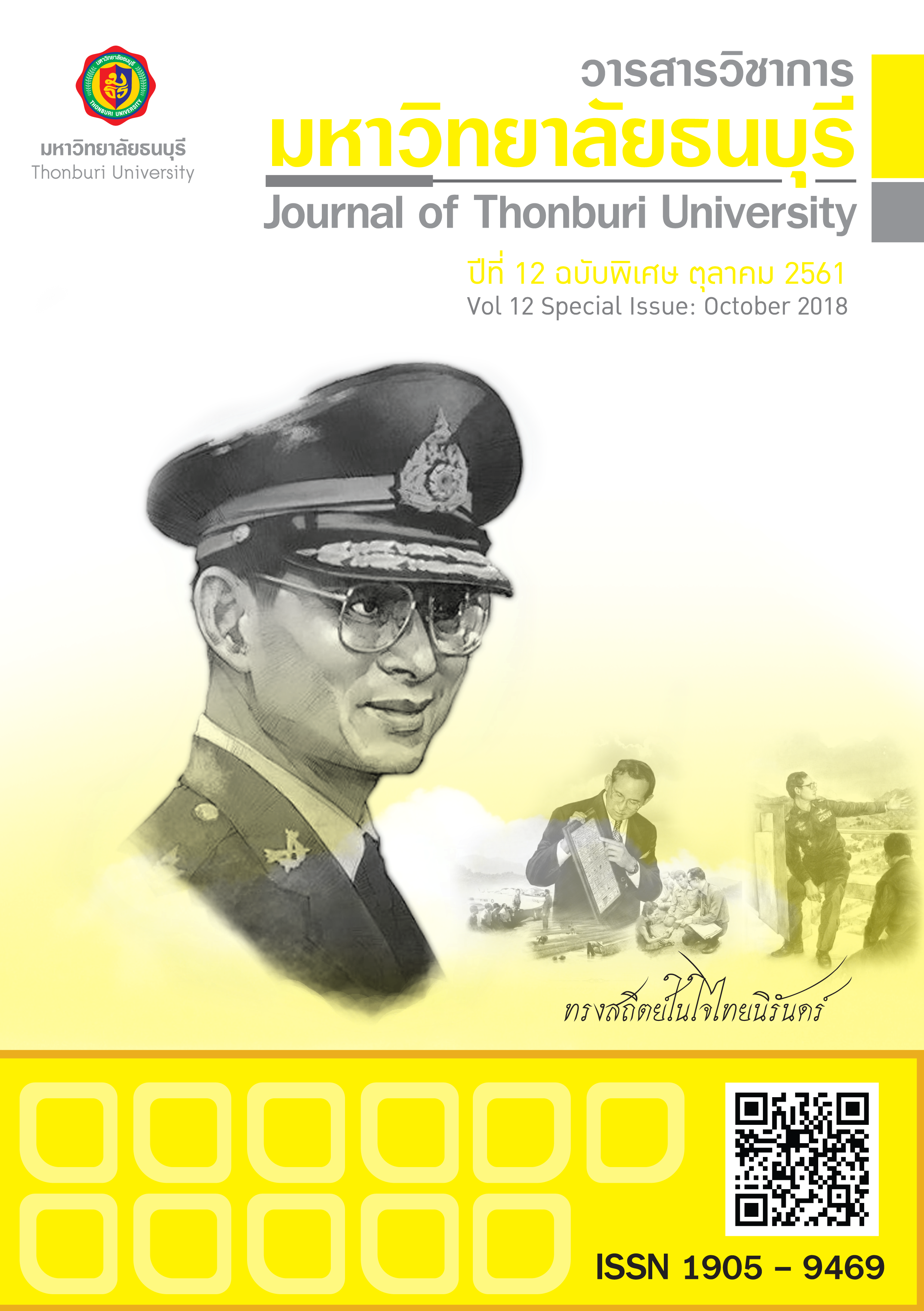EXPECTATION AND SATISFACTION TOWARDS THE TRAVEL IN THAILAND OF JAPANESE ELDERLY TOURISTS
Keywords:
Expectation, satisfaction, Japanese elderly tourists, ThailandAbstract
Abstract
This quantitative research purposed to study the travel market of Japanese elderly tourists towards expectation and satisfaction in traveling around Thailand. The questionnaire is the researching tool which is composed of 2 parts and the author used it to ask the 385 samples selected from the convenience sampling method. Statistics in this research consisted of percentage, mean, and standard deviation. Statistics for hypothesis testing was Pearson Correlation Coefficient.
According to the study, most respondents are female aged 60-64 years old. They graduated with the college degree and worked as a housewife with the average monthly salary at 200,000 Yen. They recognize Thailand through television media and have traveled to Thailand once, during July-September. The duration of traveling is 5-7 days and they traveled with their family. Most buy tour package and pay per once more than 150,000 yen. They want to return to travel in Thailand again. For the safety factor, this causes the problem in deciding to travel in Thailand of Japanese elderly tourists at the high level. Regarding each aspect, it was found that the tourists expect the price the most. Next are the physical environment, products and services, process, marketing promotion, staffs, and distribution, respectively. In terms of satisfaction, it was discovered that the overall is the high level. Considering every aspect, Japanese elderly tourists feel satisfied with the price the most. Next are products and services, staffs, physical environment, distribution, process, and marketing promotion, respectively. The tourist market that Japanese elderly tourists anticipate positively relates to the satisfaction of traveling in Thailand with statistical significance at 0.000.
Keyword: Expectation, satisfaction, Japanese elderly tourists, Thailand
References
จิตตินันท์ นันทไพบูลย์. (2551). จิตวิทยาการบริการ. กรุงเทพฯ: ซีเอ็ดยูเคชั่น.
จิราวดี รัตนไพฑูรย์ชัย. (2557). รู้เขา รู้เรา รู้อาเซียน. สืบค้นเมื่อ 3 มกราคม 2561, www.itd.or.th
ชมพูนุท พรหมภักดิ์. (2556). การเข้าสู่สังคมผู้สูงอายุประเทศไทย. กลุ่มงานวิจัยและข้อมูล สำนักวิชาการ สำนักงาน เลขาธิการวุฒิสภา. 3(16): ก-ข.
ชิษณุกร พรภาณุวิชญ์. (2540). ความคาดหวังของประชาชนที่มีต่อบทบาทการจัดการทรัพยากรธรรมชาติในท้องถิ่นของสมาชิกองค์การบริหารการบริหารส่วนตำบล : กรณีศึกษาจังหวัดแพร่. วิทยานิพนธ์สังคมศาสตรมหาบัณฑิต, สาขาสิ่งแวดล้อม, บัณฑิตวิทยาลัย,มหาวิทยาลัยมหิดล.
ธีร์ ตีระจินดาและสมบัติ กาญจนกิจ. (2557). การส่งเสริมการท่องเที่ยวสำหรับนักท่องเที่ยวผู้สูงอายุตลาดญี่ปุ่นสู่ประเทศไทย. วิทยาศาสตร์มหาบัณฑิต, จุฬาลงกรณ์มหาวิทยาลัย.
ราณี อิสิชัยกุล. (2557). การจัดการการท่องเที่ยวเฉพาะทาง. กรุงเทพฯ: สำนักพิมพ์มหาวิทยาลัยสุโขทัยธรรมาธิราช.
โรงเรียนสมาคมส่งเสริมเทคโนโลยี ไทย-ญี่ปุ่น. (2541). กระจกส่องญี่ปุ่น. กรุงเทพฯ: ดวงกมลสมัย.
ศิริวรรณ เสรีรัตน์ และคณะ. (2541). การวิจัยธุรกิจ. กรุงเทพฯ: เพชรจรัสแสงแห่งโลกธุรกิจ.
_______. (2546). การบริหารการตลาดยุคใหม่. กรุงเทพฯ: ธรรมสาร.
สันติชัย เอื้อจงประสิทธิ์. (2549). การบริหารท่องเที่ยวเชิงกลยุทธ์. กรุงเทพฯ: สามเจริญพาณิชย์ (กรุงเทพ).
สุณัฐวีย์ น้อยโสภา. (2561). ความแตกต่างทางวัฒนธรรมปัจจัยสำคัญในการขยายธุรกิจสู่ตลาดโลก. วารสารวิชาการมหาวิทยาลัยธนบุรี. 11(27): 187-194.
สุรเชษฎ์ เชษฐมาส และดรรชนี เอมพันธุ์. (2539). อุทยานแห่งชาติกับการอนุรักษ์. ใน สุรเชษฎ์ เชษฐมาส และดรรชนี เอมพันธุ์ (บรรณาธิการ),การฝึกอบรมหลักสูตรการเป็นวิทยากรด้านการจัดการพื้นที่อนุรักษ์: การบริหารการจัดการพื้นที่อนุรักษ์และการอนุรักษ์ความหลากหลายทางด้านชีวภาพ. กรุงเทพฯ: ไทยพัฒนาพานิช.
สุวิมล ติรกานันท์. (2551). การสร้างเครื่องมือวัดตัวแปรในการวิจัยทางสังคมศาสตร์: แนวทางสู่การปฏิบัติ. พิมพ์ครั้งที่ 2. กรุงเทพฯ: ศูนย์หนังสือแห่งจุฬาลงกรณ์มหาวิทยาลัย.
Cabinet Office Government of Japan. (2015). Elderly Person Statistics Report. Retrieved January 31, 2018, from www8.cao.go.jp/kourei/whitepaper/w-2017/html/gaiyou/s1_1.html
Hall, C. Mitchael. (2006). ‘Demography’ Tourism Management Dynamics: Trends, Management and Tools. Edited by Dimitrios buhalis and Carlos Costa, Elsevier Butterworth-Heinemann,Burlington, 9-18.
Naohiro,Yashiro. (1996). The Economic Effects of Aging in the United States and Japan: The Economic Position of the Elderly in Japan. Edited by University of Chicago Press, 89-107.
Sellick, Megan Cleaver;& Thomas E. Muller. (2004). “ Tourism for the Young-old and Old- old”. New Horizons in Tourism: Strange Experiences and Stranger Practices. Edited by TV Singh, CABI Publishing, Cambridge, 163-180.
Translated Thai References
Chetmas, Surachet;& Datchanee, Aimphan. (1996). National Park and Preservation. in Surachet Chetmas and Datchanee Aimphan (Editor), Reserved Area Management Lecturer Training: Reserved Area Management and Bio-Diversity Preservation. Bangkok: Thai Pattanapanich (in Thai).
Economic, Tourism and Sport. (2017). Attitude and Satisfaction in Traveling around Thailand In 2017. Office of the Permanent Secretary. (in Thai)
Euachongprasit, Santichai. (2006). Strategic Tourism Management. Bangkok: Sam Charoen Panit (Bangkok). (in Thai).
Isichaikul, Ranee. (2014). Specific Tourism Management. Bangkok: STOU Book. (in Thai)
Nanthapaiboon, Jittinan. (2008). Service Psychology. Bangkok: SE-ED. (in Thai)
Noisopha, Sunatawee. (2018). Differences of Culture: Important Factors of Business Expanding to World Market. Journal of Thonburi University Sunatthavee Noisopa. 11(27): 187-194. (in Thai)
Pornphanuwit, Chitsanukorn. (1997). Expectation of People on Local Resources Management of Sub-district Administration Organization Members: A Case Study of Phrae Province. Thesis of Master of Social Sciences, Environment Program, Faculty of Graduate Studies, Mahidol University (in Thai).
Promphak, Chompunuch. (2013). Approaching Thailand Aging Society. Research and Information Division, Bureau of Academic Affairs, The Secretariat of the Senate 3(16): a-b (in Thai)
Rattanapaitoonchai, Jirawadee. (2014). Know Each Other, Know ASEAN. Retrieved on 3 January 2018, from www.itd.or.th (in Thai)
Santichai, Euachongprasit (2006). Strategic Tourism Management. Sam Charoen Panit (Bangkok): Bangkok (in Thai).
Serarat, Siriwan et al. (1998). Business Research. Bangkok: Petchjarassaeng (in Thai).
_______. (2003). Modern Marketing Management. Bangkok: Thammasan. (in Thai).
Technology Promotion Association (Thailand-Japan) (1998). Reflecting Japan. Bangkok: Duangkamol Samai (in Thai)
Tirajinda, Tee;& Kanchanakit, Sombat. (2014). The promotion of tourism for Japanese elderly marketers to Thailand. Master of Science, Chulalongkorn University (in Thai)
Tirakanan, Suwimol. (2008). The creation of variations measuring tools for social science research: a guideline for practice. 2nded. Bangkok: Chulalongkorn University Book Center (in Thai)







